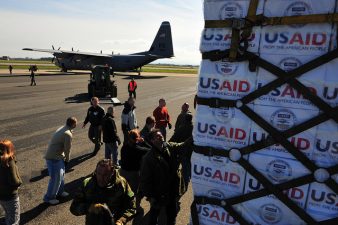 Cash cows in a time of conflict smuggled between Syria and Jordan
Cash cows in a time of conflict smuggled between Syria and Jordan
As Syria continues to be swept up in violence, Syrian farmers are smuggling their livestock (and themselves) into Jordan to sell the cattle before they can be killed in bombing raids. Traders near Jordan’s border with Syria estimate that tens of thousands of sheep have been smuggled across the border since the fighting began almost 18 months ago. Since Syrian law strictly prohibits shipping the sheep out of Syria, herders are forced to circumvent the law.
Jordanian security sources told The Media Line that Jordanian businessmen, often with ties to the security establishment, are seizing the opportunity to buy the livestock at prices far below market value, and then sell them at much higher prices.
Once the cattle arrives in Jordan, they are received by middlemen who sell them to businessmen in the nearby cities of Ramtha and Mafraq at nearly one-third of their value in the Syrian market and less than half their value in the Jordanian market, say businessmen involved in this newly growing trade.
“This is a great business, but you need to be lucky and know the right people inside Syria to connect you to herders,” Jamal Swerki, a businessman from Amman told The Media Line.
In his black pickup truck, Swerki drives along the 60-mile border almost every day looking for bargains.
He says Syrians are unable to graze their cattle in Jordan both because of the high cost of fodder and the government’s refusal to issue work permits to Syrian herders. So after crossing the border into Jordan, they are forced to sell at almost any price.
“This is a golden opportunity for people with ready cash and a place to keep the cattle,” said Sweirki, anticipating profits would triple as the year calendar heads towards Al-Adha holidays, when Muslims slaughter a sheep or a cow as a sacrifice, giving either the meat or its value to the poor.
Activists say Syrian herders in areas such as Dera’a, Deir Al-Zour, Idlib, Aleppo and Homs face a choice of losing their cattle to theft and indiscriminate shelling; or herding them across the border to Jordan. Most choose the latter despite landmine fields planted by Syrian forces to prevent cross border smuggling. They say thousands of sheep and cows are crossing into Jordan on a daily basis.
“These areas are a battle ground between Syrian rebels and government forces and often residents are the ones to pay price of this conflict,” a Syrian activist from Mezerib, a small town in the lush Yarmouk valley told The Media Line. He declined to give his name.
On a recent evening, Syrian farmer Abu Ziad herded nearly 6,000 sheep and goats across the northern border with Jordan, risking being arrested or shot at by Syrian border guards hoping to sell the animals in Jordan.
“I worked all my life to take care of my cattle. My brothers and I have lost many sheep and goats during the past few weeks,” Abu Zaid told The Media Line. “I had to sell them on the cheap or I would have lost it all.” Abu Zaid is one of tens of thousands of Syrian refugees living in the Zaatari refugee camp near the Syrian border. Refugees have complained of difficult conditions in the camp.
Syrian rebels say government forces have punished local communities which support them by killing off sheep and cows. Footage showing entire herds being killed by Syrian government troops is circulating on the Internet. Jordanian businessmen pay $100 -$150 per goat and $300- $400 for a sheep, and sell the meat for $6 per pound. So far, meat prices in Jordan have remained steady despite the growing supply.
Government forces also accuse rebels of raiding farms and stealing cattle in order to sell them in Jordan and buy bullets and guns.”
“No one is giving rebels money to buy weapons or bullets, they are using all possible means to collect cash, including theft from the local community,” said Abu Zaid.
Meanwhile, some have more serious concerns about the future of Syria and the long term impact of the lack of security. They are worried that the phenomenon is the beginning of an exodus of Syrian wealth to other countries; and fear a repetition of what happened in Iraq, when the flight of cattle was the first stage in a process that led to Iraq’s antiquities being sold-off on the world market. Eventually, they say, intellectuals left Iraq, leaving the country in ruins. Iraq is still struggling to rebuild today, years after the war ended.
This story is republished from the Middle East News Source, The Media Line
Image of cow on target from Shutterstock


